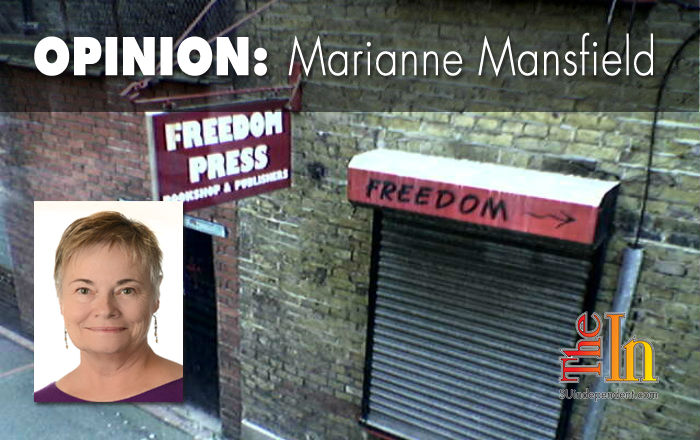There’s a press pass in my glove compartment. It was issued to me by The Independent when I helped out with exit polling for the election last November. I keep it in my car in case, Lois Lane-like, I happen upon a breaking news story and need to shove my way through crowds to get the exclusive. (And if you don’t know who Lois Lane is, Google it.) I admit to a certain stab of selfish pride that I own a Press Pass when I come across it among the car manuals and bent sunglasses I also store in the same compartment.
I’d given the pass little more thought than that until this morning as I listened to the news of the tragic terrorist attack on the Parisian offices of the Charlie Hebdo (French for Charlie Weekly) today, January 7, 2015. Charlie Hebdo is a satirical weekly newspaper, known for its polemics, cartoons and jokes. As of this writing, 12 innocent victims are confirmed dead and the 3 gunmen are at large.
Preliminary indications are that the gunmen struck in response to Charlie Hebdo’s publication of a cartoon depicting an Islamic state military group leader on the paper’s website. Nor is this the first time the offices have been the target of terrorist activity.
My paper press pass represents the thinnest of threads connecting me to the cataclysm in France, and yet what that little pass represents connects all of us who hold freedom of the press in a position of respect.
Freedom of the press, along with freedom of speech, was granted to the citizens of this country by the First Amendment of the US Constitution. It states:
“United States Constitution prohibits the making of any law respecting an establishment of religion, impeding the free exercise of religion, abridging the freedom of speech, infringing on the freedom of the press, interfering with the right to peaceably assemble or prohibiting the petitioning for a governmental redress of grievances.”
I am no Constitutional scholar, but I do recognize that the freedoms listed in the First Amendment go a long way in describing fundamental values of the society our founders hoped to establish. While each has been challenged before our nation’s Supreme Court on numerous occasions, each has essentially withstood the test of time.
And so, when I hang my little paper press badge around my neck I become a lowly member of a massive corps of writers whose right to express opinion and report facts in print is protected by no less than the Constitution of the United States of America. It is in that sense, therefore, that I do share a bond with the journalists who were slaughtered in Paris. The work of French journalists is likewise protected by a founding law, in their case The Law of Freedom of The Press of 29, July 1881.
Freedom House, an independent watchdog organization dedicated to the expansion of freedom around the world, annually rates 192 countries throughout the world on the freedom with which the country’s press operates. In 2012, the most recent year for which complete statistics are available, both the United States and France fell among the 32% (63 countries) considered to be home to essentially free presses.
That is why the outrage among the journalists and the politicians of this country echoes the anguish and outrage of the people of France. We share a common value. A value, that through the cowardly actions of terrorist gunmen has found itself under sudden and vile attack.
Before the news from Paris broke this morning, I was lamenting what we were about to be subjected to as the Republicans took control of both houses of Congress. “Pass the Keystone Pipeline project”, they’ll shout. “Repeal the Affordable Care act” they’ll cry. ”Re-write immigration reform” they’ll demand. More blah, blah from Washington. I predicted it wouldn’t be long before I’d be shaking my head in distain as the men in suits approached the podiums to dump every wrong thing at the feet of the president and his party. I’d want to throttle them. But…
Not so much anymore. My right to have my say depends on their right to have theirs. My right to express my say in print is founded on their right to do the same.
It is no small irony that the Enlightenment writer and philosopher, Voltaire, was French and a satirical polemicist. Today’s sad events in Paris accord an eerie sense of gravitas to one of his most notable quotes.
“I do not agree with what you have to say, but I’ll defend to the death your right to say it.”
Marianne Mansfield has lived in Southern Utah since 2010. She and her husband followed their grandchildren to this area from Michigan. In her former life she was a public school educator. More than half of her career was spent as an elementary principal, which is why her response to most challenges is, “This isn’t my first rodeo.” She grew up in Indiana, and attended Miami of Ohio, Ball State University and Michigan State. She is a loyal MSU Spartan and Detroit Tiger baseball fan. She has been writing fiction and opinion since her retirement in 2004.




